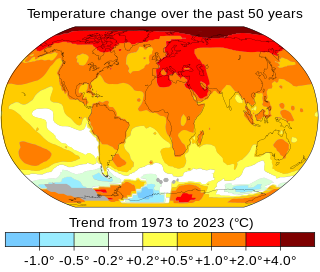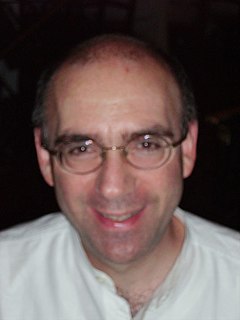Related Research Articles

The global warming controversy concerns the public debate over whether global warming is occurring, how much has occurred in modern times, what has caused it, what its effects will be, whether any action can or should be taken to curb it, and if so what that action should be. In the scientific literature, there is a strong consensus that global surface temperatures have increased in recent decades and that the trend is caused by human-induced emissions of greenhouse gases. No scientific body of national or international standing disagrees with this view, though a few organizations with members in extractive industries hold non-committal positions, and some have attempted to convince the public that climate change is not happening, or if the climate is changing it is not because of human influence, attempting to sow doubt in the scientific consensus.

Thomas John Brokaw is a American retired network television journalist and author. He first served as the co-anchor of The Today Show from 1976 to 1981 with Jane Pauley, then as the anchor and managing editor of NBC Nightly News for 22 years (1982–2004). In the previous decade he served as a weekend anchor for the program from 1973 to 1976. He is the only person to have hosted all three major NBC News programs: The Today Show, NBC Nightly News, and, briefly, Meet the Press. He formerly held a special correspondent post for NBC News. He occasionally writes and narrates documentaries for other outlets.
The Leipzig Declaration on Global Climate Change is a statement made in 1995, seeking to refute the fact that there is a scientific consensus on the global warming issue. It was issued in an updated form in 1997 and revised again in 2005, claiming to have been signed by 80 scientists and 25 television news meteorologists while the posting of 33 additional signatories was pending verification that those 33 additional scientists still agreed with the statement. All versions of the declaration, which asserts that there is no scientific consensus about the importance of global warming and opposes the recommendations of the Kyoto Protocol, were penned by Fred Singer's Science and Environmental Policy Project (SEPP).

Patrick J. ("Pat") Michaels is an American former agricultural climatologist. Michaels was a senior fellow in environmental studies at the Cato Institute until Spring 2019. Until 2007, he was research professor of environmental sciences at the University of Virginia, where he had worked from 1980.

The Day After Tomorrow is a 2004 American science fiction disaster film directed, co-produced, and co-written by Roland Emmerich. Based on the 1999 book The Coming Global Superstorm by Art Bell and Whitley Strieber, the film stars Dennis Quaid, Jake Gyllenhaal, Ian Holm, Emmy Rossum, and Sela Ward.
The Global Warming Petition Project, also known as the Oregon Petition, is a political petition designed for disinforming and confusing the public about the scientific results and the consensus of climate change research. It is framed as a petition urging the United States government to reject the global warming Kyoto Protocol of 1997 and similar policies.

The effects of climate change span the physical environment, ecosystems and human societies. They also include the economic and social changes which stem from living in a warmer world. Human-caused climate change is one of the threats to sustainability.
Laurie Ellen David is an American environmental activist. She produced the Academy Award-winning An Inconvenient Truth (2006) and partnered with Katie Couric to executive produce Fed Up (2014), a film about the causes of obesity in the United States. She serves as a trustee on the Natural Resources Defense Council and a member of the Advisory Board of the Children's Nature Institute and is a contributing blogger to The Huffington Post.

An Inconvenient Truth is a 2006 American concert/documentary film directed by Davis Guggenheim about former United States Vice President Al Gore's campaign to educate people about global warming. The film features a slide show that, by Gore's own estimate, he has presented over 1,000 times to audiences worldwide.

Climate change includes both global warming driven by human-induced emissions of greenhouse gases and the resulting large-scale shifts in weather patterns. Though there have been previous periods of climatic change, since the mid-20th century humans have had an unprecedented impact on Earth's climate system and caused change on a global scale.

Joseph J. Romm is an American author, editor, physicist and climate expert, who advocates reducing greenhouse gas emissions to limit global warming and increasing energy security through energy efficiency, green energy technologies and green transportation technologies. Romm is a Fellow of the American Association for the Advancement of Science. In 2009, Rolling Stone magazine named Romm to its list of "100 People Who Are Changing America", and Time magazine named him one of its "Heroes of the Environment (2009)", calling him "The Web's most influential climate-change blogger".
Friends of Science(FoS) is a non-profit advocacy organization based in Calgary, Alberta, Canada. The organization rejects the established scientific conclusion that humans are largely responsible for the currently observed global warming. Rather, they propose that "the Sun is the main direct and indirect driver of climate change," not human activity. They argued against the Kyoto Protocol. The society was founded in 2002 and launched its website in October of that year. They are largely funded by the fossil fuel industry.
The issue of climate change, its possible effects, and related human-environment interaction have entered popular culture since the late 20th century.
A global warming conspiracy theory invokes claims that the scientific consensus on global warming is based on conspiracies to produce manipulated data or suppress dissent. It is one of a number of tactics used in climate change denial to attempt to legitimize political and public controversy disputing this consensus. Conspiracy theorists typically allege that, through worldwide acts of professional and criminal misconduct, the science behind global warming has been invented or distorted for ideological or financial reasons.

Climate change denial, or global warming denial, is denial, dismissal, or unwarranted doubt that contradicts the scientific consensus on climate change, including the extent to which it is caused by humans, its effects on nature and human society, or the potential of adaptation to global warming by human actions. Many who deny, dismiss, or hold unwarranted doubt about the scientific consensus on anthropogenic global warming self-label as "climate change skeptics", which several scientists have noted is an inaccurate description. Climate change denial can also be implicit when individuals or social groups accept the science but fail to come to terms with it or to translate their acceptance into action. Several social science studies have analyzed these positions as forms of denialism, pseudoscience, or propaganda.

Al Gore is a United States politician and environmentalist. He is the former Vice President of the United States (1993–2001), the 2000 Democratic Party presidential nominee, and the co-recipient of the 2007 Nobel Peace Prize with the Intergovernmental Panel on Climate Change. He has been involved with the environmental activist movement for a number of decades, and has had full participation since he left the vice-presidency in 2001.

Climate change feedbacks are important in the understanding of global warming because feedback processes amplify or diminish the effect of each climate forcing, and so play an important part in determining the climate sensitivity and future climate state. Feedback in general is the process in which changing one quantity changes a second quantity, and the change in the second quantity in turn changes the first. Positive feedback amplifies the change in the first quantity while negative feedback reduces it.
Timothy Francis Ball is a Canadian public speaker and writer who was a professor in the Department of Geography at the University of Winnipeg from 1971 until his retirement in 1996. Ball then became very active in promoting climate change denial, giving public talks and writing opinion pieces and letters to the editor for Canadian newspapers. He has been a member of energy industry funded lobbying groups, and wrote for the climate change denial website Tech Central Station.

An Inconvenient Sequel: Truth to Power: Your Action Handbook to Learn the Science, Find Your Voice, and Help Solve the Climate Crisis is a book by former Vice President and environmental activist Al Gore, written in conjunction with his 2017 documentary film, An Inconvenient Sequel: Truth to Power. The book is a sequel to his 2006 book An Inconvenient Truth, published concurrently with his documentary of the same name. It was published on July 25, 2017 by Rodale Books.

Climate communication or climate change communication is a field of environmental communication and science communication focused on facilitating the communications of the effects of anthropogenic climate change. Most climate communication focuses on bringing knowledge about and potential action for responding to scientific consensus on climate change to a broader public.
References
- ↑ "Brokaw brings home global warming fight". TODAY.com. Retrieved 2017-08-22.
- ↑ "Tom Brokaw joins the battle against global warming". USA Today. 2006.
- ↑ Walsh, Bryan (2009-03-17). "Tom Brokaw's New Global Warming Documentary". Time. ISSN 0040-781X . Retrieved 2017-08-22.